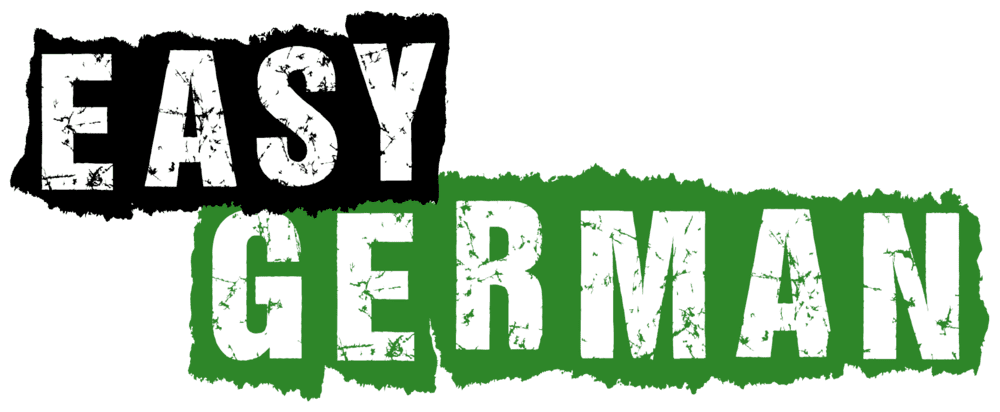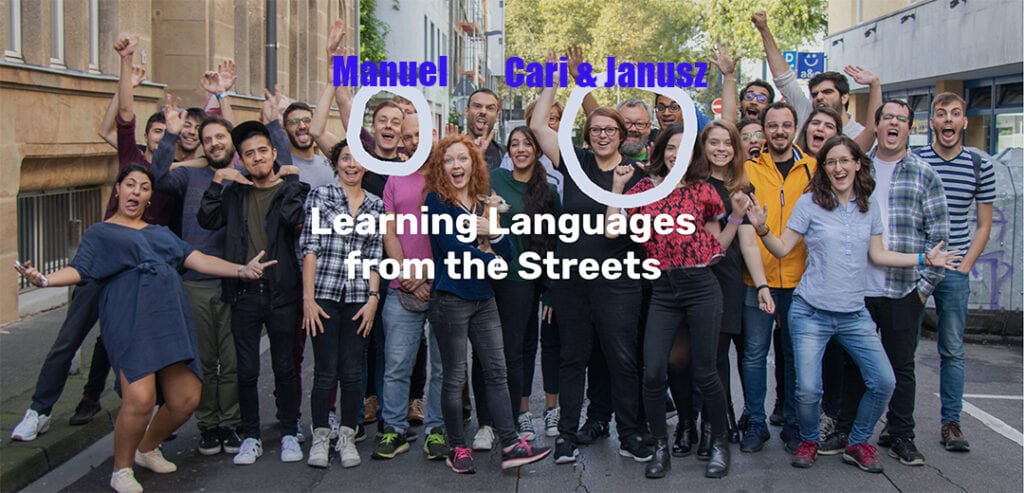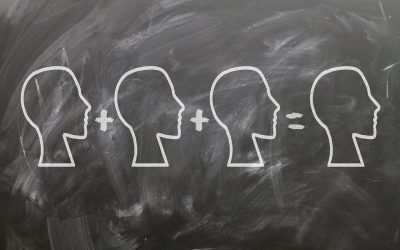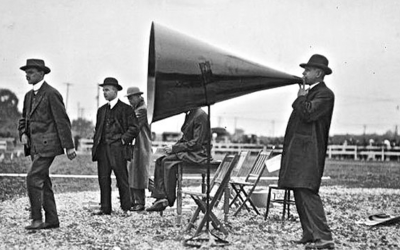German Wisdom for Old “Soles” Platform
Nuggets of wisdom from the Germans about our web platform
Sometimes wisdom comes from unexpected places. Those of you who know me also know that I tend to be awake in the middle of the night or early hours of the morning. Years ago, I would spend that time DXing across the shortwave bands listening to Radio Moscow and trying to figure out what would be in the news before the New York Times or Washington Post hit the streets. That radio world changed with the internet.
Now I listen to podcasts and YouTube educational instruction videos ranging from NancyPi’s tutorials on solving calculus differential equation problems to the Crazy Russian Hacker’s mind-numbing life-hacks. What can I say? I don’t always sleep through the night.
That brings me to the Germans—or rather, to “Easy German,” with Cari, Janusz, and Manuel—my effervescent, German Patreon-platform language tutors. You wonder why I don’t sleep?
I watch each of these middle-of-the-night distractions for different reasons. NancyPi speaks to my frustrated inner mathematician who could never crack the symbolic code necessary for when people say, “Just follow the science,” to actually FOLLOW the science. No one, except for a chosen few, is capable of following the science. The rest of us follow someone’s interpretation of the science. Let’s be honest.
The Crazy Russian Hacker is just plain hysterical. I don’t know if it is the affectation of his highly polished Cold War accent or the ridiculous life hacks he presents, but after only one video, I was as hooked as a Middle School student on Snap Chat.
But Easy German is a different story and one that has led to this article. Yes, I engage this platform to sharpen my feeble German language skills, but unexpectedly, I am learning what might work best for the Wisdom of Old “Soles” web platform. I watch how I engage Easy German and then squeeze it for all the juicy wisdom that comes out.

WEB PLATFORM VERSUS WEBSITE
The rest of this article is about what wisdom I am gleaning about building a functional web platform. But first, it is essential to note that unlike the other videos I referenced on YouTube, Easy German is more of a “web platform” than a website—much like how we envision Wisdom of Old “Soles.”
The Easy German folks are trying to teach a skill. It’s more like mentoring than classroom teaching. It’s also a lot harder to accomplish. They not only present engaging “from the street” conversation videos, but all kinds of helpful add-ons. These tools range from follow-along real-time transcripts to simultaneous translation to a robust APP (Seedlang) that helps build vocabulary in a dynamic participatory way beyond the monotony of memorizing endless word lists.
Everything more or less fits under the “Easy German” banner, but each of these tools is a different offering, so to speak. If you subscribe to Easy German through the Patreon website, you can find it all. They have created an effective interactive environment to mentor people in learning the German language and understanding German culture.
Add it all up, and it’s more of an interactive learning platform than just a website.
That’s also the kind of platform we want to build to mentor the next generations of leader-believers. We don’t want to teach AT them. We want to EQUIP them. It’s also a lot harder to accomplish.

ALL MINISTRY IS LOCAL IN ORIGIN
To understand why and how we need to build a robust web platform and not just a website, we need to remember our first core principle. I’ve already published (and will post again) these five core principles. The first is that “all ministry is local in origin.”
That means we are not building an internet ministry disassociated from people meeting together in time and space. Zoom doesn’t entirely cut it. I argued in a previous article that virtual school didn’t work for our children. Neither does it work for the church. We are real people with real bodies created to interact in real space and time. Online tools and community can augment in-person relationships but must not replace them.
The practical outworking of this principle is that the web platform must meet the needs of the people who are meeting offline in Clusters (or “believing communities” or “congregations”). Remember, these Clusters are the church, and as such, they make disciples and multiply. That’s the Lord’s mission (Matthew 28:18-20). Our web platform must help these believers grow to maturity and make other disciples.
We need to build an online environment that mentors people, not just gives them information. Effective mentoring requires participation, not just communication. It involves trial and error with the ability to receive wisdom and counsel from others along the way.
So the Wisdom of Old “Soles” platform not only contains Bible teaching, theology, and an “Ask Me Anything” section, it also includes interactive webinars, Zoom-type mentoring, and individual Help Desk responses. Our platform becomes a type of router to direct people to other resources and people who can help mentor in ways we could never do—or do as well.
It is an interactive environment for mentoring. That will require a lot of technology that already exists. But it will also require a lot of human resources, so we need to build the platform to what already exists locally. That is why this principle is so important. All ministry is local in origin. We build to those we have.
The ministry may be local “in origin,” but it grows in an online environment. It never loses its local roots. As local ministries multiply, the online components multiply as well. Networks of local ministries produce a platform of online resources. Just think of it as replication on the cellular level. Rather than trying to create an entire body from the start, we’re just working on the cells, each of which carries the church’s whole DNA.
If we try to start big by creating a sprawling web platform—beginning with a body, not the cells—we are sure to create Frankenstein. It will become as uncontrollable as well. The point is that we are building an entire interactive platform to mentor, but we are building the platform to handle what already exists locally. We build small and practical and grow the platform as the physical ministry and ministries grow. They are linked. Remember, these local ministries are networks of networks of smaller believing communities. (See my previous article, The Church Is About to Change).
HOW I USE THE EASY GERMAN PLATFORM
We turn now to how I find myself using the Easy German platform and the wisdom I have been gleaning in the middle of the night to help us build the Wisdom of Old “Soles” web platform.
Wisdom Nugget #1: I Don’t Engage Every Day, So Build To The Need, Not The Content
Even though I am a highly motivated German student, I still do not engage the web platform every day. At first, I thought, shame on me—especially since I pay a modest monthly membership fee. My German mentors are pumping out three or more podcasts weekly, plus really engaging video street interviews. Add to that, they create worksheets, vocabulary APP content, stories, and even funny outtakes. And I am interested in it all! Still, I don’t engage every day.
Shame on me?
Not really. I suspect I am typical. After all, I have a life—maybe not much of one at 3 am, but nonetheless, I don’t feel as obligated to check in every day any more than I feel the responsibility to read through every email or look at every cat meme.
So what is the lesson? BUILD TO THE NEED, NOT THE CONTENT.
I use the platform as I can and how I need it. I can catch up because everything on the internet is time-shifted to my convenience. These are podcasts and resources, not normally live broadcasts (though there are some). A teaching platform tends to be a push environment where prerecorded lectures convey content. But a mentoring platform is a pull environment where interaction happens around content and wisdom as needed.
In short, we offer plenty of content, but it has to be helpful, digestible, and provided just in time for those who need it.
Wisdom Nugget #2: Variety Is the Spice of Life, So Mix It Up
The old way of learning a foreign language was listening to some conversations, repeating what was said, learning some grammar, memorizing some vocabulary, and maybe gaining some cultural insights. If you had a lot of money or time, you could enroll in an immersion program to be bombarded 24/7 by native speakers until your brain somehow wired itself to speak a new language. Some people got it—they were heralded as the success stories. Others never did. Presumably, they were shipped silently off to language gulags.
The internet and globalization have changed the approach allowing for a variety of sensory experiences and language immersion. You can still learn grammar, but now conversations and cultural immersion come through audio and video podcasts as well as APPS that pair native speakers from around the world.
Easy German gives me multiple audio podcasts per week and video “German from the streets” interviews. They add to it worksheets, grammar lessons, stories, scrolling vocabulary hints, and instantaneous translation (or German subtitles). And just to make it all easier to find, I get a personalized RSS feed to access the podcasts from my RSS reader right along with my other daily/weekly podcasts. They come to me; I don’t have to go to them. Convenience and variety. A LOT of variety!
Honestly, they offer so much variety I don’t use every tool. But after a few months, I notice I can watch German television shows (thanks to the internet), and my comprehension level has increased. The tools are somehow working to my surprise (Überraschung!) even though I don’t know how I learned the definition of surprise!
The point is that the platform is needs-based and must contain variety. We are mentoring people, not programming them. People learn differently, and in fact, they learn differently at different times. The technology allows for variety, and that makes a better interactive mentoring environment. It’s just a lot harder to build.
Wisdom Nugget #3: We Cannot Go It Alone, So Hold Hands With Your Partners
I was a few months into the Easy German experience, and I kept wondering how this small team of Germans in Berlin was able to produce such a high-quality platform. “They must be geniuses!” I thought. “And really well-funded. How can they produce so many videos, podcasts, worksheets, and a killer APP?”
As I said, I was a few months into the Easy German experience when I found out that Easy German is part of a global network of Easy Languages (though I still don’t know their whole story). They are all doing the same thing in different development stages worldwide—teaching language and culture. And together, they are adding to the online platforms.
I checked out their website, and there on their home page was a picture of an energetic group of language mentors. Right in the middle of the image stood MY Cari, Janusz, and Manuel! Notice that by now, I refer to them as MINE! I would say they have built a successful relational platform if I feel a connection to them. They are not “real” friends. But they have invested in my German learning from their cyberspace platform. If I ever met them, I would buy them dinner.

This photo is of the global Easy Language team. I don’t know any of these people, but I would meet any of them at Starbucks. Look how much fun they are having teaching people languages around the world. I found out they existed because one of the Easy German podcasts announced that the Easy Languages family had just grown with the addition of the Catalan language podcast. Who’d have guessed? And just in case you’re interested, about 10 million people worldwide speak Catalan (4.1 million native speakers), and it is the native language of the Principality of Andorra.
The bottom line is that as it turns out, Easy Languages is building an online web platform throughout the world as a network of networks of real people mentoring real people who are using the internet to mentor people to learn language and culture. See the parallel with Wisdom of Old “Soles?”
The partnerships are not merely handholding with like-minded people. Neither are they traditional affiliates. It’s not a list of URL links on their website. These people are a global interconnected (somehow) organization that is (apparently) decentralized, local in origin, people-focused, and using technology to augment their language and culture-mentoring mission. Hurray them! We want to do the same.
To do so, we need partners. What kind of partners?
We need people partners, and we need online partners.
The people partners are those who are presently multiplying the church. Our terminology is “Cluster partners.” But in essence, we partner with the church locally wherever disciples make disciples, leaders train leaders, and disciple-making communities multiply into disciple-making communities no matter what you call them.
Remember that the body of Christ builds itself up as each part does its work (Ephesians 4:11-16). The Spirit gives the church gifts to facilitate that growth (Rom. 12:3-8; 1 Cor. 12:12-31). That means we need to help each other across networks of networks to grow and make disciples. Technology and our platform help augment the disciple-making and disciple-multiplying mission.
Every ministry Cluster is local in origin. But they are all interconnected. The platform can help them all as they all participate through the platform. But they never lose sight that ministry happens locally. Just look at the Easy Language people as an example.
We also need online partners.
Online partners are people and organizations who help build the platform or help facilitate the use of the platform to augment local ministry. They may be individual tech partners with special skills, or they may be content providers. They may be Help Desk monitors or webinar presenters. They could be online leadership coaches, Bible Cluster coaches, Bible teachers, Journey Group facilitators, writers, graphic artists, and prayer intercessors.
They might be organizations that provide instruction and specialized ministry skills among specific age groups, on campuses, among various demographics, or in particular crises.
The platform contains networks of networks—peoples and organizations—open-sourcing at its best, but not the wild, wild west. Wisdom of Old “Soles” acts as an online router or orchestra leader, but all ministry remains local.
LEARNING FROM THE GERMANS
It is often difficult to explain new concepts. Remember the early days of the personal computer? Many could not envision a handheld device that would replace mail, telephone, television, and so much more. Some thought that personal computers were good for balancing checkbooks, playing games, and doorstops! We’ve obviously come a long way.
The Wisdom of Old “Soles” platform can be challenging to explain, but it is not new. The technology already exists, as do some examples of its practical use. And that is what I am learning from Easy German and my middle-of-the-night perambulations.
Wisdom Nugget #1: I Don’t Engage Every Day, So Build To The Need, Not The Content
Wisdom Nugget #2: Variety Is the Spice of Life, So Mix It Up
Wisdom Nugget #3: We Cannot Go It Alone, So Hold Hands With Your Partners






